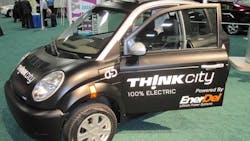Most Americans Unaware of Financial Advantages of Owning Electric Car
A survey co-authored by two Indiana University researchers indicates U.S. consumers know little about the tax incentives and other financial benefits of owning plug-in electric vehicles.
The survey, administered to more than 2,000 drivers in 21 of the nation’s largest cities, revealed that 95 percent of the respondents didn’t know about state and local subsidies, rebates and other incentives. A large majority, 75 percent, was uninformed about the savings in fuel and maintenance costs that all PEVs are expected to generate compared to gasoline vehicles.
“It is well established that current mainstream consumer interest in these vehicles is low,” said John D. Graham, one of the co-authors of the report. “What should be particularly troubling for PEV proponents and manufacturers is that the respondents to our survey live in major urban areas, the places where PEVs make the most sense due to daily travel patterns. For sales to increase, consumers need to be better informed about the financial incentives and advantages of owning an alternatively fueled car.”
Graham is dean of the Indiana University Bloomington School of Public and Environmental Affairs and authored the report along with Sanya Carley of SPEA and Rachel Krause and Bradley Lane from the University of Kansas. Their report, “Perception and reality: Public knowledge of plug-in electric vehicles in 21 U.S. cities,” was published in the latest issue of the journal Energy Policy.
The survey questioned drivers about the two major types of plug-in electrics: battery electric vehicles such as the Nissan Leaf and plug-in hybrid electric vehicles such as the Chevrolet Volt and some models of the Toyota Prius.
President Barack Obama has set a goal of having 1 million plug-in vehicles on U.S. roadways by 2015, but sales so far have added up to only a fraction of that. That’s despite federal consumer tax credits of as much as $7,500, subsidized installation of recharging stations, and numerous state and local financial incentives, along with favored access to high-occupancy vehicle lanes and city parking.
“Only two out of 758 survey respondents living in areas where subsidies for home-charging equipment are offered were aware of their availability,” the researchers note. “The low rate of awareness of state and local PEV incentives suggests the incentives have not yet been meaningfully communicated to members of the mainstream public.”
In addition to being uninformed about financial benefits, a majority of consumers also can’t answer basic factual questions about the cost of owning a PEV. “If consumers believe they have higher purchase prices, higher fuel and maintenance costs and lower driving ranges than they actually do, they’re not going to shop for them when it comes time to buy a new car,” Carley said.
If car buyers have false perceptions about the advantages of PEV ownership, they’re also unlikely to pay attention to communications about the incentives, further complicating the challenge for governments and industry, the report concludes.
More information about the survey:
The online survey was conducted in October 2011, just before the Nissan Leaf and Chevrolet Volt were made widely available, so the results should be seen as a baseline of general knowledge and opinions about PEVs. The survey was conducted in these cities: Austin, Baltimore, Boston, Charlotte, Chicago, Dallas/Fort Worth, Detroit, El Paso, Houston, Indianapolis, Jacksonville, Los Angeles, Memphis, Nashville, New York, Philadelphia, Phoenix, San Antonio, San Diego, San Jose/San Francisco and Seattle.
